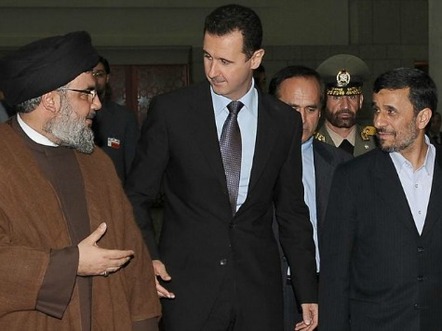Experts Say Pro-Assad Response Depends on Aim of Strikes

Any retaliation by Syria and its allies to limited Western military strikes would be restrained, but large-scale intervention aimed at ousting President Bashar Assad would inflame the region, analysts say.
Tensions have ratcheted up dramatically in recent days as Washington has warned Syria's regime it will face action over alleged chemical weapons strikes in Damascus in which hundreds are said to have been killed.
Those tensions became more palpable on Tuesday, when U.S. Defense Secretary Chuck Hagel said his country's forces were "ready to go" if called upon by President Barack Obama.
But, analysts note, the breadth and intensity of the pro-Assad response will depend greatly on the type of action taken against his regime.
"Everything depends on the nature, the extent and the goals of a Western strike and, for the moment, I expect nothing more than a warning strike," said Joseph Bahout, a Syria expert and professor at Sciences Po in Paris.
"In this scenario, neither Hizbullah nor Iran will go too far. We can expect 'lateral and indirect' moves like aggression towards UNIFIL (the U.N. peacekeeping force in Lebanon) or anonymous rockets against Israel but, in the end, it will not be anything new."
Iran and Russia are Assad's principal international allies, while Hizbullah has fought alongside Syrian army forces against rebels in the country.
But if Western powers press ahead with moves to overthrow the regime, that could change the response tremendously.
"In this case, we cannot rule out an extreme response, particularly from Iran," Bahout said.
"And there is at least one unknown -- Russia's reaction."
Moscow on Tuesday warned a military intervention in Syria could have "catastrophic consequences" for the region, but Russian Foreign Minister Sergei Lavrov has said his country would not get involved in a military conflict.
Syrian Foreign Minister Walid Moallem said the country had defenses that would "surprise" the world.
Moves towards Western retaliation against Damascus seemed to be getting louder as the United States and its allies mull military action.
A top Iranian military chief warned on Sunday that the United States will face "harsh consequences" if it intervenes in Syria over the chemical attack claims.
"For the moment, Iran is launching warnings, but if the Americans decide to intervene, they will fall into their (Iran's) trap," said Amir Mohebian, an analyst and journalist based in Iran.
"Iran will sit back and watch as the Americans and their allies sink into a quagmire."
But Bassam Abu Abdullah, head of the Damascus Center for Strategic Studies, says even a limited conflict could degenerate into something broader.
"The Americans could strike to preserve their image with their allies who have criticized their inaction, to take a position of strength as compared to Russia in peace negotiations and to give a boost to rebels on the ground," he said.
But, "if such a strike does happen, it will not stop there, because the other side will respond... and the whole region will be embroiled in a regional war."
"For now, though, none of the actors want to show their hand."
Ibrahim al-Amine, head of Al-Akhbar, a Lebanese daily, echoed those remarks.
"Who can guarantee that things will stop at that point," he asked.
"Who can guarantee that such a confrontation will not degenerate into a wider war and that a strike will not open the gates to hell?"
Assad has warned Washington against such a strike, but has not revealed the outlines of a response.
"The United States faces failure just like in all the previous wars they waged, starting with Vietnam and up to our days," he said.
On Tuesday, Muallem defiantly vowed that the country would respond forcefully to any attack.
"We have two options: either to surrender, or to defend ourselves with the means at our disposal," he told a press conference in Damascus.
"The second choice is the best: we will defend ourselves."
For Damascus's allies, the red line looks to be military action targeting the overthrow of the regime.
In late April, Hizbullah chief Sayyed Hasan Nasrallah said Damascus "has true friends in the region who will not allow Syria to fall into the hands of the United States, Israel and 'takfiri' groups," referring to Sunni extremists.
"If the situation gets more dangerous, states, resistance movements and other forces will be obliged to intervene effectively in the confrontation on the ground," he added.
Indeed, at least one organisation has already threatened retaliation in the event of such strikes.
"The regional interests of those who participate in aggression against Syria would be legitimate targets," said Anwar Raja, a Damascus-based spokesman for the Popular Front for the Liberation of Palestine-General Command.



